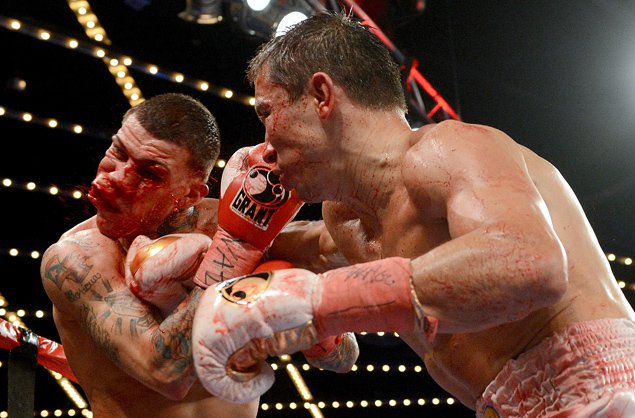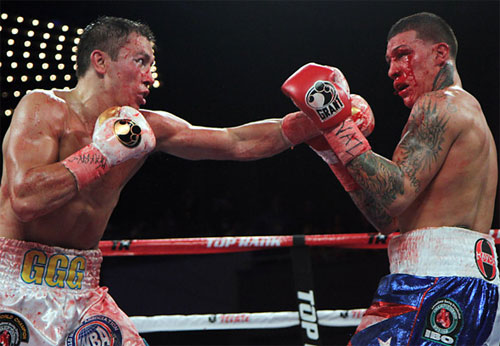In hindsight, Gennady Golovkin (41-1-1, 36 KOs) was always going to be a superstar. His combination of power, technical excellence, affable personality and aggressive style was always going to appeal to fight fans. However, less than a decade ago, it seemed possible that the Kazakh would become the latest in a long line of fighters to fall victim to the politics of the sport.
After in excess of 350 fights in the unpaid ranks, with only a handful of losses, ‘GGG’ turned professional with German promoters Universum Box-Promotions, in 2006. By 2010, the promotional outfit had run into financial difficulty. Golovkin refused to allow the Universum’s predicament to derail his career, opting to box in Panama, picking up the WBA ‘interim’ middleweight title against Milton Nunez (WTKO1).
The sanctioning body would soon after upgrade Golovkin to ‘Regular’ champion. The following year, Golovkin successfully split from Universum, signing a promotional deal with K2 Promotions. Despite having defended his title four times, all coming by way of stoppage, it still seemed unlikely that Golovkin would go on to conquer America, due to his limited grasp of the English language and the absence of a standout victory.
Golovkin’s big break presented itself in the form of a unification with, WBO champion, Dmitry Pirog, which was scheduled to take place in New York and would be televised on HBO. A back injury sustained by Pirog resulted in the contest falling through, and ultimately forced the Russian to retire. Still, HBO remained interested in Golovkin, allowing ‘GGG’ to make his U.S debut against Grzegorz Proksa. Golovkin sent his opponent to the canvas on three occasions, obliging referee, Charlie Fitch, to halt the fight in the fifth round.

The Proksa bout introduced Golovkin to a new audience, but it was his next battle that truly put him on course to achieving ‘The American Dream.’ Four months on from the destruction of Proksa, Golovkin defended his title against tough Philadelphian Gabriel Rosado, at Madison Square Garden’s The Theatre, in New York.
While the challenger possessed a modest 21-5 record, he entered on the back of a seven-fight winning streak, sacrificing his mandatory position to fight Cornelius Bundrage for the IBF super-welterweight title, in favour of taking on Golovkin.
The bout is the focus of the first episode of ‘The Making Of’ featuring Golovkin reliving the pivotal moments of his career, which is available to stream on DAZN’s global platform as of today.
The magnitude of the opportunity he was presented with was not lost on Golovkin. Many of the sport’s most iconic contests have taken place at The Garden; including the first two instalments of the trilogy between Muhammad Ali and Joe Frazier. Golovkin was acutely aware that that it was imperative to produce a dominant, entertaining performance against a foe that U.S audiences were familiar with.
“Back then I only had one strategy,” Golovkin told The Making Of. “Get out there and win, step into the ring and punch. I had to take control of the fight and take the lead which means strong, powerful punches, applying constant pressure and not letting him go. And this is all because I always set out to smash my opponent to destroy him and not to play checkers with him or play tag, as some boxers say. I just wanted to finish him.

“That particular fight with Rosado was really important because I had to demonstrate my prowess, style and ambition and my desire to win and determination to get all the possible titles and belts.”
Golovkin achieved his objective from the opening bell as Rosado did not appear to have an answer to the Kazakh’s combination of heavy hands and accuracy.
Rosado’s woes intensified in the second round as Golovkin opened up a cut above the challenger’s left eye. By the end of the contest, Rosado would suffer several lacerations above his left eye, severe swelling beneath it and blood pouring from his nose. Golovkin’s predominantly white shorts and gloves, his face and legs were all covered in Rosado’s blood. The sight was more reminiscent of a scene from a slasher movie rather than a prize-fight.
Outgunned, outclassed and injured, Rosado knew the odds were against him, but valiantly he battled on.
“It came from the jab,” Rosado said. “I’d never had a history with cuts, so it was my first time experiencing multiple cuts over the left eye. I had a cut over the brow and right underneath and also right under the lid. Three cuts on the same eye, so from the second round on, I was fighting pretty much blind, and really struggling to see so I’m already fighting a guy who is world class level and now I’m dealing with this blood, so it was pretty crazy.”
Rosado’s resilience eventually paid modest dividends in the fifth round. A gutsy showing from Rosado saw him stand with his heavier handed opponent to land his own shots. A mouse underneath Golovkin’s eye was testament to Rosado’s success.
However, it appeared that effort required to gain a foothold in the fight took a toll on Rosado. In the sixth, the combination of blood and swelling was obscuring Rosado’s vision. Golovkin simply could not miss. At the end of the frame, the Philadelphian’s corner broached the subject of calling a halt to proceedings, but Rosado’s fighting pride refused to let them do so.
“In the moment it’s tough,” Rosado recalled. “You can’t see, your family is ringside, there’s a lot going on, but I was willing to endure that, for that moment, rather than be looked at as a quitter. That’s something you can’t get back, man. I couldn’t live with myself giving in and I refused to.

“I had mentally prepared myself to do whatever it takes to try and win the fight. I already had my mind made up. It was difficult, my trainer was telling me he was going to stop the fight, I was telling him, give me another round. If I was going to go out, I was going out on my shield.”
Rosado’s team yielded, allowing their fighter one more round. However, Golovkin maintained the momentum he had built during the previous frame, landing hurtful shots at will. Trainer Billy Briscoe had seen enough and threw the towel in to end the contest.
For Golovkin, it was mission accomplished having achieved what he set out to do.
“Yes, it was a really bloody and dramatic battle,” Golovkin recalled. “I would say, it was messy, but people love all this. It’s the drama that they want to see… basically, they love blood… which that fight had.”
What makes Golovkin’s performance all the more impressive is that he was feeling unwell before bout. While other fighters may have attempted to delay the contest, ‘GGG’ knew that the opportunity was too great to let it pass by. He remained undeterred accepting that injury and illness are part and parcel of fighting.
“I think every athlete, every boxer doesn’t always step into the ring completely prepared to fight,” Golovkin said. “There are always things you have to accept, overcome and put up with. At that time, I was really very ill. We were thinking about cancelling the fight as I had a fever. Because we were tested by the doping commission all the time, I couldn’t take any medication. I couldn’t even take aspirin.
“It was all chaotic. It’s your first fight at Madison Square Garden you have a good opponent, and you are sick. But no one really cares if you’re sick or not. If you happen to have an unexpected result no one will ask if you were sick or not or if you were ready or not You just have to go for it.”
Golovkin’s relentless pursuit of knockouts inside the ring belies his kindness outside it. After the contest, when a perplexed Rosado was attempting to come to terms with what he had just encountered, he enquired as to what Golovkin’s secret was and the champion was happy to let Rosado witness it first-hand.
“I had a conversation with Rosado,” Golovkin said. “He asked: ‘How do you do it? What do you eat? How did you get like this?’ I said: ‘If you want to try, come to the gym we’ll train a little bit, and you’ll find out a lot more. Come to my gym and we’ll train together.’ [Rosado replied:] “Yeah, we will do that and work together’. He never came.”